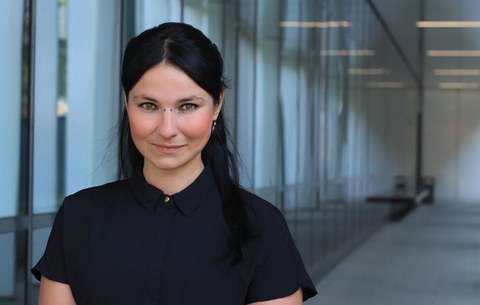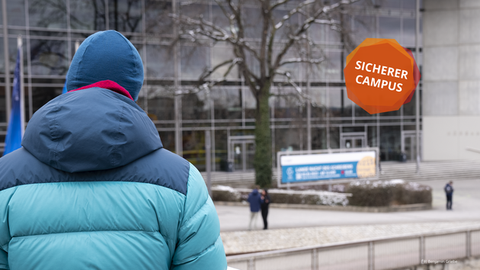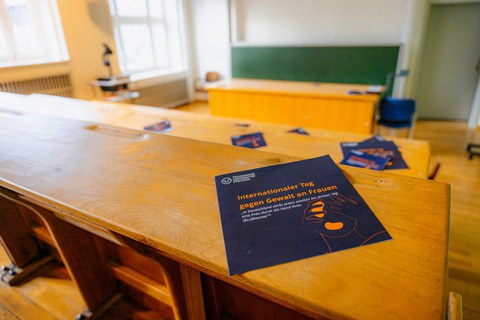Oct 28, 2025
Five years of the Complaints Office, five years of activism against gender-based violence: Interview with Anja Wiede
The Complaints Office for Incidents of Harassment, Discrimination and Violence celebrates its fifth anniversary this year at TUD Dresden University of Technology. The university has organized a program for the International Day for the Elimination of Violence Against Women, which will take place for the fifth time in November. This milestone on two fronts is an ideal opportunity to assess the current situation: Where do we stand in dealing with sexual harassment, discrimination and violence at universities?
In this interview, culTUre talks to Anja Wiede, the first point of contact at the Complaints Office for Incidents of Harassment, Discrimination and Violence, and discuss the impact of gender-based violence at universities, what measures TUD has already established in this regard and what further steps are needed to effect lasting change.
What is understood by "gender-based violence"? What does the term actually cover?
Gender-based violence, often also referred to as sexual harassment, discrimination and violence, refers to any form of violence directed against a person based on their ascribed or assigned gender. This encompasses physical, sexual, psychological, economic and digital forms of violence. It can occur in all areas of life: in public spaces, at work, at university, in partnerships or behind closed doors.
Violence is understood as a continuum, i.e. a range of different types of behavior. This ranges from derogatory comments to sexualized "jokes,” unwanted touching, serious physical and sexualized violence or even femicide. This means that gender-based violence does not only begin when there is an unambiguous criminal offense. Most of those affected experience this violence far below this threshold. The consequences are evident in daily life, and can be either subtle or overt, but manifest in issues such as difficulty concentrating or sleeping, a lapse in performance or even social isolation.
The General Act on Equal Treatment defines sexual harassment as a form of gender discrimination. The decisive factor is not the intention of the harasser, but the effect on the person concerned. This means: If an (unwanted) action has a degrading or humiliating effect, or oversteps a boundary, it must be taken seriously as harassment.
And an essential point in all of this: We deliberately speak of sexualized and not sexual violence. Sexualized violence uses sexuality as a means of exercising power, control or to degrade. It's not about attraction or intimacy, it's about dominance, overstepping boundaries and violating autonomy.
Who is (directly/indirectly) affected by gender-based violence at universities?
Gender-based violence does not stop at universities. Universities are a part of society and thus reflect its power relations, inequalities and discrimination dynamics. Therefore, sexual harassment, discrimination and violence is an issue for all university members, where they are directly affected, they commit these acts themselves or bear witness to them.
There is a thought experiment to illustrate how strongly our ideas are shaped. If we are asked to imagine a situation of sexualized violence, many of us have a very narrow picture in mind. Usually a young, white, able-bodied woman. People who are marginalized in multiple ways, such as plus-sized women, people with disabilities, queer people or people who have experienced racism, are often not thought of as victims in this picture, but in some cases are even stereotypically imagined as perpetrators of said violence. This image is false and prevents those affected from being seen and taken seriously.
Statistically, it is well documented that sexual harassment, discrimination and violence is predominantly perpetrated by men. Other factors, such as education or social status, hardly play a role. More relevant are attitudes and personality traits such as a low capacity for empathy, narcissistic tendencies, hostile sexism, a striving for power or a strong orientation towards hierarchies.
The UniSAFE study on gender-based violence at European universities clearly shows that people with disabilities, queer people and people who have experienced racism are more likely to experience sexual harassment, discrimination and violence. At the same time, both women and men report such experiences. Overall, two thirds of the study participants stated that they had experienced gender-specific violence at their own institution, while one third had experienced sexual harassment/violence. Only 10 percent reported these experiences. People who did not report it said that they were not sure if the incident was serious enough, that they did not think anything would happen or that they feared retaliation.
Because sexual harassment, discrimination and violence is an abuse of power, it primarily affects people who are in relationships of dependency or hierarchy, for example students in relation to lecturers or employees with fixed-term contracts. Under this lens, universities are therefore not only places of knowledge, they are also places of inequality. And that is precisely why they have a responsibility to ensure safe, non-discriminatory structures.
What is TUD Dresden University of Technology doing to protect its members?
A lot has happened at TUD in the past five years. Among other things, we are guided by the so-called 7-P model put forward by the UniSAFE study, which identifies key areas of action for the prevention of sexual harassment, discrimination and violence.
1. Policies
With its policy on dealing with harassment, discrimination and violence, TUD has created a binding framework in which sexualized violence is explicitly named and addressed.
2. Prevention
There are a variety of measures for raising awareness, networking and empowerment. Every year, for example, events are organized to mark the International Day for the Elimination of Violence Against Women in November, or the International Day Against Homophobia, Biphobia, Interphobia and Transphobia in May. We are also the only university to provide the workshop "Bringing in the Bystander,” which provides participants with the skills to intervene and prevent sexual violence from happening. Public campaigns such as "Safe Campus" by the social media team also help to raise awareness, make knowledge accessible and strengthen civil courage. To this end, TUD participated in the “Orange the World” campaign, lighting up the Rector’s Office and Gerber Building in orange in 2021.
3. Provision of services
Members of TUD can obtain confidential or anonymous internal advice, for example from the central and decentralized Equal Opportunities Officers or from me as a trained specialist in the prevention of sexualized violence in the workplace. The StuRa and many student councils also promote awareness at events. At the same time, we are well networked with external, specialist counseling centers such as Opferhilfe e.V., Gerede e.V., the D.I.K., the Männeretzwerk and sowieso e.V..
4. Protection
The BKMS digital reporting platform has created anonymous, easy access to the Complaints Office. Those affected can report incidents to the Complaints Office and receive support and advice on how to proceed.
5. Prosecution
The Complaints Office for Incidents of Harassment, Discrimination and Violence was established in 2020. It carefully examines incoming cases from various perspectives and then initiates appropriate measures that help to intervene and prevent further incidents.
6. Prevalence
TUD actively supports research and data collection on this topic. It was part of the Europe-wide UniSAFE study and supports students in carrying out their own investigations. I also report annually to the Senate on news and developments in this regard. This transparency is by no means a matter of course in the university context.
7. Partnerships
We work across universities, for example in the bukof Commission for Sexualized Discrimination and Violence of the Federal Conference of Gender Equality Officers in Higher Education in Germany. This exchange makes it possible to work together to develop standards and further expand institutional responsibility.
However, this is only a shapshot of what is already happening at our university. Nevertheless, it remains clear that prevention and protection are not closed processes. It is a ongoing and, in particular, shared task that we all have together and which we must pursue.
What can each individual member of the university do?
Every single person can make an important contribution. The first step is to put sexual harassment, discrimination and violence out of the taboo zone. As long as we don't talk about it, the problem remains invisible and those affected remain alone. It helps to start small. With your colleagues, friends or family. Only then do many people realize how much such incidents shape the everyday lives of others. On November 25, 2025, the International Day for the Elimination of Violence Against Women, we can talk about this at the GetTUgether on campus, or during the film screening "Looking into the Sun” (German: In die Sonne Schauen) in the Zentralkino. This raising of awareness is crucial so that we don’t shift responsibility away from ourselves.
This also includes respecting boundaries, both your own and those of others. We should pay attention to our language and not dismiss sexualizing or derogatory comments as "harmless fun." When we witness someone overstepping a boundary, it is important not to look away. It doesn't have to be heroic. You can intervene directly, get support or have a conversation with the affected person later. And if the situation is difficult, for example due to a dependency relationship, it can be helpful to record the events informally at first: What happened when, where, how and with whom?
Those affected need people who listen to them, take them seriously and trust them to decide for themselves which next steps are right for them. It is therefore important to know the right contacts and where you can get help at the university.
And finally, it requires self-reflection: What role do I play myself? Which structures am I perhaps consciously or unconsciously supporting? A university only becomes a safe place for everyone when we do not delegate responsibility, but assume it together.
If you want to delve deeper, make sure to take advantage of the courses offered by the Center for Continuing Education. Workshops on dealing with sexual harassment, discrimination and violence in the university context are regularly held there.

As part of the “Orange the world” campaign, the rectorate building is lit up in orange.
What else needs to change in the future to create a safe and non-discriminatory study and work environment for everyone at TUD?
If we take diversity and gender equality as serious cornerstones of our university, then sexual harassment, discrimination and violence must not be left out of the equation. The consequences for those affected are often critical: A lapse in performance, withdrawal from campus life, dropping out or even changing universities are no rarity. Anyone who wants to promote diversity must therefore also ensure safety for those who are particularly and frequently affected, such as queer people or individuals who have experienced racism. To do this, we need to look at the power relations in which boundaries are overstepped. Sexual harassment, discrimination and violence is not necessarily individual misconduct, but an expression of structural inequalities.
What I experience again and again in my work: Workshops and lectures on this topic are predominantly attended by non-male people. Sexual harassment, discrimination and violence is not a "women's issue." It affects us all. I would therefore like to see much more willingness to take responsibility, especially from those in positions of power, or from those with resources or creative leeway at the university. Raising awareness should not just be a voluntary additional offer that is addressed "if it piques our interest." It must be continuously anchored in our studies, teaching and administration as a component of professional action.
And finally, it's about not only talking more about the topic, but also listening better. Those affected must be able to trust that their experiences will be taken seriously. We need a culture in which they are not forced into defending themselves or in which their credulity is called into question. The author Rupi Kaur captures this feeling perfectly: "I'll be quiet when we can say sexual assault and they stop screaming liar."



